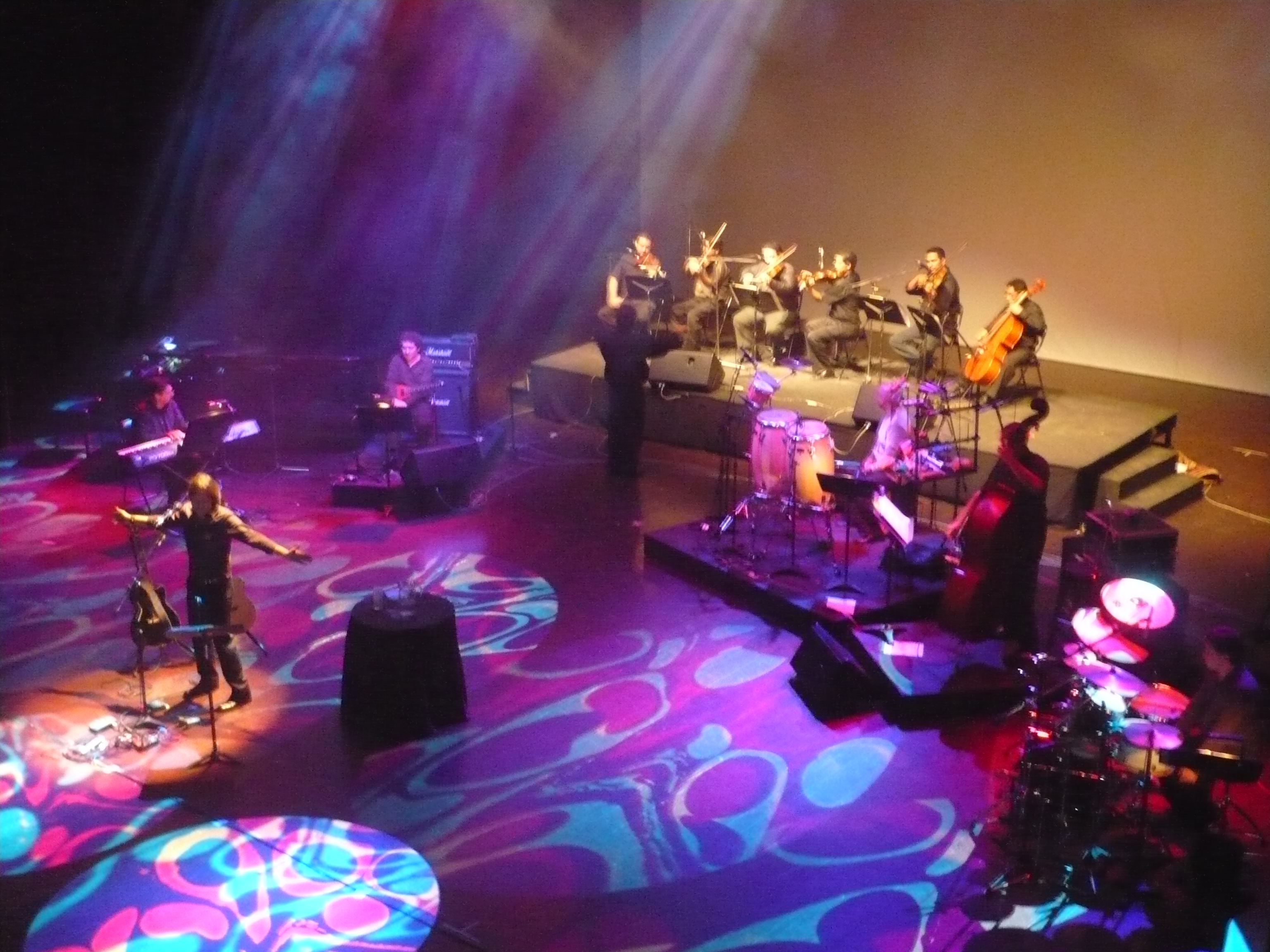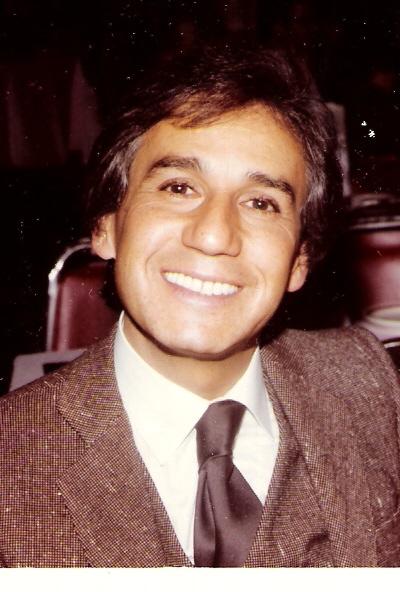|
OTI Festival 1978
The OTI Festival 1978 was the seventh edition of the annual OTI Festival. It was held in Santiago, Chile, who offered to stage the event after Nicaragua, who won the 1977 contest, was unable to organize it due the outbreak of the Nicaraguan Revolution. Organised by the Organización de Televisión Iberoamericana (OTI) and host broadcasters Televisión Nacional de Chile, Canal 13, UCV Televisión and Canal 9, the contest was held at the Municipal Theatre of Santiago on Saturday 2 December 1978 and was hosted by Raquel Argandoña and Raúl Matas. Matas had previously presented the inaugural OTI Festival back in 1972 in Madrid. In this year's edition, in which many changes took place, the winner of the show was the Brazilian entrant Denise de Kalafe with her song "El amor... cosa tan rara" (Love... such a strange thing). Background According to the original rules of the OTI Festival, the winning country of the previous year would organise the contest of the following year ... [...More Info...] [...Related Items...] OR: [Wikipedia] [Google] [Baidu] |
Municipal Theatre Of Santiago
The Teatro Municipal, National Opera of Chile is the most important stage theatre and opera house in Santiago, Chile. History and overview The Chilean government ceded a significant parcel of land in downtown Santiago to the municipality, in 1848, and an 1853 decree by President Manuel Montt Torres provided for the construction of a municipal theater in his nation's capital, by then a rapidly growing city. French Chilean architect Claudio Brunet des Baines was commissioned for its design, and its construction was entrusted to another French Chilean, civil engineer Felipe Charme de l´Isle. Brunet des Baines created a French Neoclassical exterior for the theater, though his 1855 death left the supervision of the design to his countryman, Lucien Hénault, and to the latter's assistant, Manuel Aldunate. The new team also benefited from a collaboration with Charles Garnier, the architect of the Opéra National de Paris. The Teatro Municipal was inaugurated on September 17, 1857 ... [...More Info...] [...Related Items...] OR: [Wikipedia] [Google] [Baidu] |
Carlos Mejía Godoy
Carlos Mejía Godoy (born June 27, 1943) is a Nicaraguan musician (accordion), composer and singer. He was born in Somoto, Madriz. Son of Carlos Mejía Fajardo and María Elsa Godoy, his brother Luis Enrique Mejía Godoy, three years younger than he is, is also an acclaimed and much-loved musician. Carlos and Luis Enrique were pivotal in the New Song Movement in Central America beginning in the 1970s. They were both honored with Nicaragua's highest cultural distinction, the Order of Rubén Darío. Biography Carlos started his career as 'Corporito' on the radio station 'Radio Corporacion', where he would daily compose songs that would rain ridicule and scorn on all politicians and political parties. Many of his songs, performed with his band ''los de Palacagüina'', became associated with the Sandinista movement as songs of the workers and revolutionaries. He even composed a Mass for the working class, the ''Misa Campesina Nicaragüense''. Many of his songs during the late 1970 ... [...More Info...] [...Related Items...] OR: [Wikipedia] [Google] [Baidu] |
Paraguay In The OTI Festival
Paraguay and its member station Canal 13 Paraguay (Now Red Paraguaya de Comunicación RPC), debuted in the OTI Festival in its seventh edition, which was held in Santiago in 1978. The first Paraguayan representative in the contest was the veteran Rolando Percy, who got a disappointing 18th place with zero points. The same singer would return to the event in 1990 and 1995 with disappointing placings. Since their debut, the Guarani country participated almost uninterruptedly except in 1982, their only withdrawal from the contest. History Just like the most of the participating countries and broadcasters in the OTI Festival, Canal 13 Paraguay selected its entrants internally. Their participants in the contest were not very successful, but in 1981, the country reached the top 10 for first time with Alberto de Luque and his song "Vos y yo seremos todos" (You and me will be everybody) which placed 8th. After a withdrawal in 1982, the next year in Washington, D.C., Paraguay recorded one ... [...More Info...] [...Related Items...] OR: [Wikipedia] [Google] [Baidu] |
Chile In The OTI Festival
Chile started participating in the OTI Festival in 1972 in Madrid and continued participating in an uninterrupted way till the last Show held in 2000 in Acapulco. History This country won the contest in two occasions: the first one in 1984 with the singer-songwriter Fernando Ubiergo with his song "Agualuna" (Moonwater). The second Chilean victory came in 1998 with the strambotical rapper and comedian Florcita Motuda with his song "Fin de siglo, es hora de inflamarse deprimirse o transformarse" (End of century, It's time to get wild, to get depressed or to transform ourselves). Apart from their victories, the Chilean member stations got the second place in the festival with Alberto Plaza and his song "Canción contra la tristeza" (A song against sadness) in 1995. Chile also got three third places in 1976 with Alfredo Fuentes and his song "Era solo un chiquillo" ("I was just a little child"), in 1985 with Juan Carlos Duque and his song "Para poder vivir" (To be able to live) ... [...More Info...] [...Related Items...] OR: [Wikipedia] [Google] [Baidu] |
Guatemala In The OTI Festival
This Central Américan country made its debut in the OTI festival in 1974 when the contest was being held in the Mexican tourist city of Acapulco. Guatemala and its OTI member TV Station, Televisiete participated in the event almost uninterruptedly and withdrew only twice, in 1978 and 1979. The participation of Ricardo Arjona, who represented his country in 1987, is of particular note. Although he only managed to get the 12th place, he rose quickly to stardom. History Although Guatemala sent some well known names to the OTI Festival, this country had a lustreless trajectory in the festival. The Guatemalan Broadcaster never managed to win the festival. This country placed second in 1974, their debut year, with Tanya Zea. The country managed to reach the top 10 again in 1976 with Hugo Leonel Baccaro and in 1980 with Grupo Madrigal. Since then, the Central American Country got only moderate placings. National Final Following the example of México, Chile and later Cuba, Televisi ... [...More Info...] [...Related Items...] OR: [Wikipedia] [Google] [Baidu] |
Mexico In The OTI Festival
Mexico and its member station Televisa, participated in the OTI festival 26 times making its debut in 1973, one year after the start of the contest. During the contest’s run, Mexico was one of the most successful nations with a record six wins, including a back-to-back victory in 1989 and 1990, and 14 top 3 finishes. History Mexico was along with Spain the most successful country of the history of the festival with six victories. Apart from the victories, the country ended in the top 10 on 19 occasions. The first Mexican victory came in 1973 in Belo Horizonte with Imelda Miller who sung the song "¡Que alegre va María!" (How happy goes Mary!!). Two year later, the country won again the contest in San Juan with the song "La felicidad" (The happiness) sung by Gualberto Castro. One decade later, México won again the contest with the folk singer Eugenia León, who sung "El fandango aquí" (The fandango is here) in a very controversial victory, which was attributed to the solida ... [...More Info...] [...Related Items...] OR: [Wikipedia] [Google] [Baidu] |
Manuel Montt
Manuel Francisco Antonio Julián Montt Torres (; September 4, 1809 – September 21, 1880) was a Chilean statesman and scholar. He was twice elected President of Chile between 1851 and 1861. Biography Montt was born in Petorca, Valparaíso Region, the son of Catalan immigrants. His family was very poor, and in 1822, the death of his father increased their hardship. The same year, Manuel's mother secured his entrance into the Instituto Nacional (''National Institute''), where he also would serve as rector later in life (1835–40), though he could only afford the fees by tutoring other students. After studying law at the Instituto Nacional, he graduated as a lawyer in 1833 and soon achieved prominent academic and government posts. Montt had a distinguished career as a scholar, and was introduced into public life during the presidency (1831–1841) of José Joaquín Prieto by Diego Portales. Montt distinguished himself by his courage in the crisis that followed upon Portales' ... [...More Info...] [...Related Items...] OR: [Wikipedia] [Google] [Baidu] |
Teatro Municipal De Santiago De Chile
Teatro may refer to: * Theatre * Teatro (band) Teatro, Italian for "theatre", is a vocal group signed to the Sony BMG music label. The members of Teatro are Jeremiah James, Andrew Alexander, Simon Bailey and Stephen Rahman-Hughes. Band members Jeremiah James Jeremiah James was born in upst ..., musical act signed to Sony BMG * ''Teatro'' (Willie Nelson album), 1998 * ''Teatro'' (Draco Rosa album), 2008 {{disambiguation ... [...More Info...] [...Related Items...] OR: [Wikipedia] [Google] [Baidu] |
Rubén Darío National Theatre
The Rubén Darío National Theatre ( es, Teatro Nacional Rubén Darío) is the national theatre of Nicaragua. It is located in the capital, Managua, and was named in honor of Nicaragua's (and one of Latin America's) most renowned poets, Rubén Darío. History The National Theater was one of the few major buildings to survive, within the centre of Managua, after the devastating 1972 Managua earthquake. The Theater The Nicaraguan National Theater is a leading venue for cultural life in Managua, including music, theater and the visual artsThe theater serves as the most important theater for shows and concerts. See also *Culture of Nicaragua Culture and language Music and religious icons find their roots in Iberian culture and Amerindian sounds and flavors. The west of Nicaragua was colonized by Spain and has a similar culture to other Spanish-speaking American countries. The east ... External linksRubén Darío National TheaterOfficial WebsiteVianica.comAll about the Nationa ... [...More Info...] [...Related Items...] OR: [Wikipedia] [Google] [Baidu] |
Valparaíso
Valparaíso (; ) is a major city, seaport, naval base, and educational centre in the commune of Valparaíso, Chile. "Greater Valparaíso" is the second largest metropolitan area in the country. Valparaíso is located about northwest of Santiago by road and is one of the Pacific Ocean's most important seaports. Valparaíso is the Capital city, capital of Chile's second most populated administrative region and has been the headquarters for the Chilean Navy since 1817 and the seat of the National Congress of Chile, Chilean National Congress since 1990. Valparaíso played an important geopolitical role in the second half of the 19th century when it served as a major stopover for ships traveling between the Atlantic and Pacific oceans by crossing the Straits of Magellan. Valparaíso experienced rapid growth during its golden age, as a magnet for European immigrants, when the city was known by international sailors as "Little San Francisco" and "The Jewel of the Pacific". Notable inhe ... [...More Info...] [...Related Items...] OR: [Wikipedia] [Google] [Baidu] |
UCV Television
TV+ (pronounced ''Te Ve Más'' or TV Más) is a Chilean free-to-air television channel. which is broadcast from Santiago. Previously known as the Television Corporation of the Pontifical Catholic University of Valparaíso or UCV Televisión, it was the oldest television station in the country and the only regional network outside of Santiago that had nationwide coverage. It started broadcasting on an experimental level in the Pontifical University of Valparaíso's buildings in 1957 and was officially launched in August 1959. In 2017, it moved its offices to the Agua Santa district in Viña del Mar. On 21 November 2018 at 5:00pm, the channel was rebranded as "TV+" and premiered a new graphical package. In late-November, the digital-terrestrial-television subchannel UCV 3 (controlled by the PUCV) would be rebranded as UCV Televisión, broadcasting from its original studios in Viña del Mar. In recent years, the television station's audience share started to plummet. In 2016, the Po ... [...More Info...] [...Related Items...] OR: [Wikipedia] [Google] [Baidu] |

.jpg)




